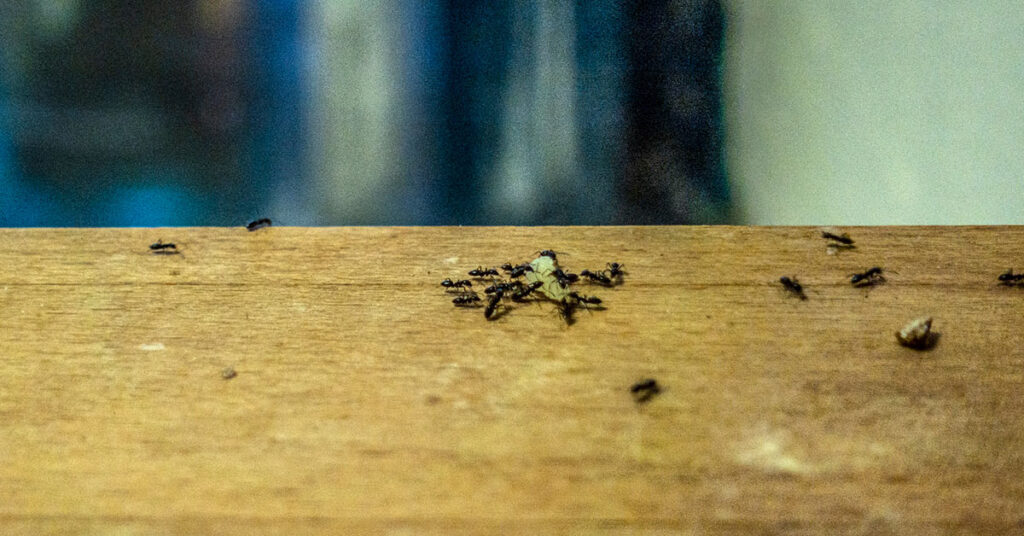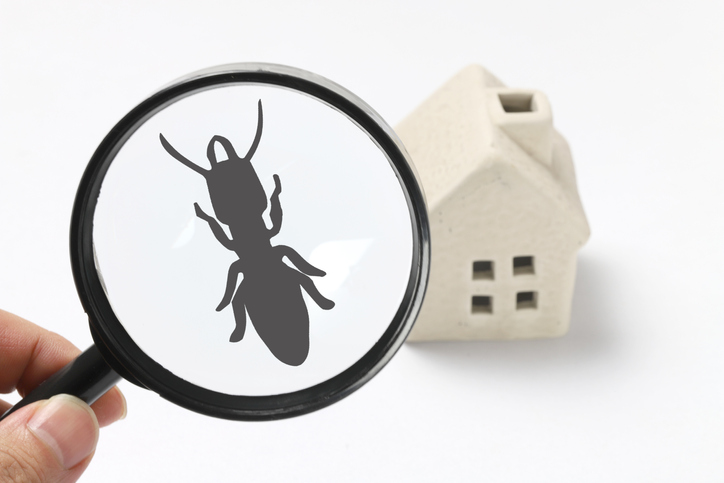In the quest for effective and environmentally friendly ant control, natural methods have gained significant popularity. Exploring the use of essential oils and homemade solutions, homeowners have sought alternatives to chemical pesticides to manage ant infestations. This comprehensive guide has delved into various aspects of natural ant control, covering topics such as remedies, repellents, essential oils, homemade traps, and unconventional methods. By understanding these techniques, individuals can make informed decisions and implement sustainable strategies to combat ant problems while minimizing harm to the environment.

Table of Contents
- Understanding Natural Ant Control
- How Do Natural Ant Repellents Compare To Chemical Pesticides?
- Can Ants Develop Resistance To Natural Repellents Over Time?
- Are There Any Specific Types Of Ants That Are More Susceptible To Certain Natural Repellents?
- What Are Some Eco-Friendly Ways To Deal With Ant Colonies?
Understanding Natural Ant Control
From utilizing natural remedies and repellents to understanding ant behavior and preferences, natural ant control aims to effectively eliminate ant infestations while prioritizing human and environmental safety.
What Are Natural Remedies To Eliminate Ant Infestations?
Natural remedies to eliminate ant infestations include several methods that are considered eco-friendly and safe for both humans and the environment. Some common natural remedies include:
Diatomaceous Earth
This natural powder is made from fossilized remains of tiny organisms and is harmless to humans and pets. Sprinkle diatomaceous earth around ant trails or entry points. When ants come into contact with it, the powder dehydrates their exoskeleton, leading to their demise.
Vinegar
Vinegar helps in getting rid of ants due to its strong odor, which repels them. When sprayed near ant trails or entry points, vinegar disrupts their scent trails and discourages them from entering the area.
The pros of using vinegar as an ant killer include its availability, affordability, and non-toxic nature. Vinegar is safe to use around children and pets. However, the cons include its temporary effectiveness, as the scent dissipates quickly, requiring frequent reapplication. Additionally, vinegar may not eliminate the entire ant colony, only acting as a deterrent.
Citrus Peels
Citrus peels can repel ants because ants dislike the strong smell of citrus. Placing citrus peels near entry points or areas where ants are present can help deter them from entering or exploring further.
Essential Oils
Certain essential oils, such as peppermint, tea tree, and lemon oil, have strong scents that ants find unpleasant. Dilute a few drops of essential oil with water and spray it around ant-infested areas.
Mint
Mint has been found to have some effect on controlling ants. The strong scent of mint is known to be unpleasant to ants, making them less likely to enter areas where mint is present. Planting mint near entry points or using mint essential oil in a diluted form can help repel ants.
Bay Leaves
Bay leaves are believed to be effective in keeping ants away. The smell of bay leaves acts as a natural repellent, deterring ants from entering the areas where they are placed. It’s important to note that bay leaves may not eliminate the entire ant colony, and their effectiveness may vary depending on the ant species.
Cinnamon
Cinnamon is known to work as an ant repellent. Ants dislike the scent of cinnamon and tend to avoid areas where it is present. Sprinkling cinnamon powder near entry points or along ant trails can help deter ants from accessing specific areas.
Baking Soda
Baking soda alone may not be effective in repelling ants. While it does not kill ants directly, some people use baking soda as part of a baiting method. Mixing baking soda with powdered sugar and placing it near ant trails can attract ants, as they are attracted to the sugar. When ants consume the mixture, the baking soda can interfere with their digestive system, eventually leading to their demise.
Bleach
While bleach can kill ants on contact, it is not considered a viable long-term option for keeping ants at bay. The primary purpose of bleach is for disinfection and cleaning, rather than ant control. Moreover, using bleach as a repellent may not be safe for indoor use due to its toxic nature.
Dryer Sheets
Dryer sheets are not proven to have a significant effect on deterring ants. While some people believe that the scent of dryer sheets repels ants, the effectiveness is anecdotal, and scientific evidence supporting their ant-repellent properties is lacking. Therefore, relying solely on dryer sheets may not provide reliable ant control results.
Coffee Grounds
Ants dislike the strong scent of coffee grounds. Scatter used coffee grounds around ant nests, entry points, or areas where ants are a nuisance. The coffee grounds create a natural barrier that ants prefer to avoid.
Boiling Water
Boiling water can be an effective method to eliminate ant colonies outdoors. Locate the ant hill or nest, and carefully pour boiling water directly onto it. The hot water destroys the ants and their colonies, providing a natural and environmentally friendly solution.
How Do Natural Ant Repellents Compare To Chemical Pesticides?
Natural ant repellents, such as those mentioned above, offer a safer alternative to chemical pesticides. While chemical pesticides can be effective in controlling ant infestations, they may contain harmful ingredients that can be toxic to humans, pets, and beneficial insects. Natural repellents are generally considered safer as they rely on scents and natural substances to repel ants without causing harm. However, it’s important to note that natural repellents may require more frequent application and may not provide immediate results compared to chemical pesticides.
Can Ants Develop Resistance To Natural Repellents Over Time?
Ants have the ability to adapt and develop resistance to various substances, including natural repellents. While there isn’t extensive research on ants developing resistance specifically to natural repellents, it is possible for them to become less affected by certain repellents over time. To maintain effectiveness, it’s recommended to rotate or combine different natural repellents to prevent ants from becoming resistant to a particular substance.
Are There Any Specific Types Of Ants That Are More Susceptible To Certain Natural Repellents?
Peppermint oil has been found to be particularly effective against odorous house ants (Tapinoma sessile), white vinegar and citrus-based solutions can deter pavement ants (Tetramorium caespitum). Cinnamon has shown effectiveness in repelling Argentine ants (Linepithema humile), while bay leaves have been known to deter carpenter ants (Camponotus spp.). Black pepper can act as a deterrent for pharaoh ants (Monomorium pharaonis), while cloves have been found to be effective against red imported fire ants (Solenopsis invicta).
What Are Some Eco-Friendly Ways To Deal With Ant Colonies?
Natural Barriers
Create physical barriers using substances that ants find difficult to cross, such as powdered cinnamon, coffee grounds, or baby powder. Place these barriers near entry points to discourage ants from crossing into your home.
Borax Baits
Mix borax with a sweet substance like sugar or syrup to create a homemade bait. Place the bait near ant trails or in areas where ants are active. The ants will consume the mixture and take it back to the colony, effectively killing the entire colony.
Professional Assistance
If the ant infestation persists or becomes overwhelming, consider seeking help from pest control professionals who specialize in eco-friendly or organic pest control methods. They can provide targeted solutions while minimizing the impact on the environment.
Delving Into The World Of Essential Oils
How To Use Essential Oils To Repel Ants
Essential oils can be used as natural ant repellents by creating a diluted solution or spray. To use essential oils, mix a few drops of the oil with water or a carrier oil such as coconut oil or almond oil. Shake the mixture well and apply it to areas where ants are present or along ant trails. Additionally, you can soak cotton balls or absorbent material with the diluted essential oil and place them strategically around entry points or areas prone to ant activity.
Which Essential Oils Are Effective In Repelling Ants?
Peppermint Oil
Peppermint oil is particularly effective in repelling odorous house ants (Tapinoma sessile) and Argentine ants (Linepithema humile). These ant species find the strong scent of peppermint oil unpleasant, causing them to avoid areas treated with the oil.
Tea Tree Oil
Tea tree oil has been found to be effective in repelling carpenter ants (Camponotus spp.) and pharaoh ants (Monomorium pharaonis). These ants are deterred by the scent of tea tree oil and tend to avoid areas treated with it.
Lemon Oil
Lemon oil is known to be effective in repelling pavement ants (Tetramorium caespitum) and citronella ants (Lasius spp.). The citrusy scent of lemon oil acts as a deterrent for these ant species, discouraging them from entering treated areas.
Eucalyptus Oil
Eucalyptus oil is known to repel fire ants (Solenopsis spp.) and thief ants (Solenopsis molesta). The strong scent of eucalyptus oil acts as a natural repellent, deterring these ant species from invading spaces where the oil is applied.
Can Essential Oils Be Harmful To Pets Or Children When Used As Ant Repellents?
While essential oils can be effective in repelling ants, it is essential to use them with caution around pets and children. Some essential oils, such as tea tree oil and eucalyptus oil, can be toxic to pets if ingested or applied directly to their skin in concentrated forms. It is recommended to dilute essential oils properly and keep them out of reach of children and pets. Additionally, it’s advisable to observe any reactions or sensitivities in pets or individuals with respiratory conditions when using essential oils. If any adverse reactions occur, discontinue use and consult a healthcare professional or veterinarian.
Homemade Solutions and Strategies
How To Make Homemade Ant Traps
Homemade ant traps can be an effective and affordable solution for dealing with ant infestations. Here’s a simple recipe for making homemade ant traps:
Borax And Sugar Trap
Mix equal parts of borax and sugar in a small container. Add enough water to create a paste-like consistency. Place small amounts of the mixture on small pieces of cardboard or shallow lids. Position these traps near ant trails or areas where ants are frequently seen. The ants will be attracted to the sweet sugar and consume the mixture, which contains borax that acts as a slow-acting poison, eventually eliminating the colony.
Vinegar And Dish Soap Trap
Fill a shallow dish with a mixture of equal parts vinegar and water. Add a few drops of dish soap and stir gently. Place the dish near ant entry points or where ants are active. The vinegar disrupts their scent trails, while the dish soap reduces the surface tension of the liquid, causing the ants to drown.
Are There Any Precautions To Take When Using Homemade Ant Traps?
When using homemade ant traps, it’s important to take certain precautions. To begin, ensure that the traps are placed out of reach of children and pets to prevent accidental ingestion. Consider positioning the traps in areas that are inaccessible to them, such as behind furniture or along baseboards. Additionally, it is advisable to avoid placing the traps directly on surfaces where food is prepared or consumed to prevent any potential contamination. Regular monitoring of the traps is necessary to ensure their effectiveness and replace them if they become contaminated or dry out. By taking these precautions, you can safely and effectively utilize homemade ant traps as part of your natural ant control strategy.
What Are Some Signs That Natural Ant Control Methods Are Working?
Within the first few days of implementing the methods, you may observe a reduction in ant activity, with fewer ants present in your home or treated areas. Ant trails may start to become less defined or show signs of disruption.
As you continue applying the natural control methods for a couple of weeks, you should notice a significant decline in the ant population. The number of ants seen in the vicinity will continue to decrease, and ant trails may disappear altogether. This indicates that the natural methods are effectively reducing the ant population over time.
After several weeks, you should start noticing a lack of new ant entry into your home or finding new pathways. The barriers created by the natural control methods deter ants from entering, resulting in a decrease in ant activity within your living spaces.
As time progresses, you may observe the absence of ant nests or colonies. This could manifest as a lack of ant hills or a significant reduction in ant colony activity. These signs suggest that the natural control methods have been successful in eliminating or greatly reducing the ant colonies.
Enhancing Effectiveness And Maintenance
Can The Effectiveness Of Natural Ant Control Methods Be Enhanced By Combining Multiple Remedies?
Yes, combining multiple natural ant control methods can enhance their effectiveness. Here are some combinations:
For sugar-loving ants (such as Argentine ants or sugar ants), create a homemade ant trap by combining a mixture of sugar and borax. Mix equal parts of powdered sugar and borax and place small amounts of the mixture in shallow containers near ant trails or entry points. The sugar attracts the ants, while the borax acts as a toxic bait that the ants carry back to their colony, effectively eliminating them.
For grease- or protein-loving ants (such as odorous house ants or pavement ants), prepare a homemade ant trap using a mixture of honey and boric acid. Combine one part honey with one part boric acid and place it in small containers near areas where these ants are active. The ants are attracted to the sweet scent of honey, and the boric acid acts as a slow-acting poison, eventually eradicating the colony.
The homemade ant control method is to use essential oils as repellents. Certain ant species, like red fire ants or carpenter ants, can be deterred by peppermint oil. Dilute a few drops of peppermint oil with water and spray the solution along ant trails, entry points, and areas prone to infestation. The strong scent of peppermint disrupts the ants’ pheromone trails, making them less likely to enter treated areas.
How Often Should Natural Ant Control Methods Be Applied To Maintain Effectiveness?
The frequency of applying natural ant control methods varies depending on the specific method used and the timeline for maintaining effectiveness. Apply the natural ant control methods daily for the first week. This initial period allows the methods to establish a strong presence and disrupt ant activity. After the first week, reduce the frequency of application to every 2-3 days. Monitor the ant activity and adjust the application frequency based on the level of infestation. If you notice increased ant activity, return to daily application temporarily until the activity subsides. Once the ant population is significantly reduced, you can reduce the application frequency further to once or twice a week. This maintenance schedule helps to deter any remaining ants and prevents new infestations.
Can Ants Return After Using Natural Repellents?
While natural repellents can be effective in deterring ants, it is possible for ants to return, especially if the underlying attractants or entry points are not addressed. Natural repellents create barriers and discourage ants from entering treated areas, but they may not eliminate the entire ant population or prevent new ants from finding alternative pathways. It is important to identify and eliminate potential food sources, seal entry points, and maintain cleanliness to minimize the chances of ants returning. Combining repellents with other preventive measures can help create a more robust defense against ant reinfestation.
How Long Does It Take For Natural Ant Control Methods To Show Results?
On average, it may take anywhere from a few days to a few weeks to observe noticeable results. However, it’s important to note that the specific timeline can be influenced by factors such as the severity of the infestation, the type of ant species, and the chosen natural control methods.
In some cases, you may start to notice a decrease in ant activity within the first week of implementing the methods. This can include fewer ants seen in your home or a reduction in ant trails. However, for more significant infestations, it may take closer to two to three weeks to achieve substantial results and observe a significant decline in the ant population.
Consistency and patience are key during this period. It’s important to continue applying the natural control methods as instructed and regularly monitor the infested areas for any signs of improvement. If you do not see substantial results within the expected timeframe, it may be necessary to reassess your approach and consider additional measures or consult with a professional pest control service.
Conclusion
Natural ant control methods provide a viable and eco-friendly approach to managing ant infestations. From utilizing specific remedies for targeted ant species to exploring the effectiveness of essential oils and homemade solutions, homeowners have a diverse range of options to choose from. While natural remedies may require patience and consistency, they offer long-term solutions that prioritize the well-being of both humans and the environment. By combining multiple methods, maintaining regular maintenance, and monitoring the effectiveness, individuals can achieve effective ant control while minimizing the use of chemical pesticides. Ultimately, understanding and implementing natural ant control methods contribute to a healthier and more sustainable living environment.




